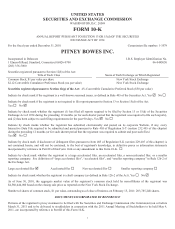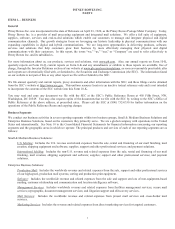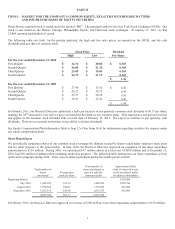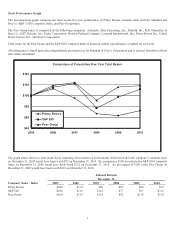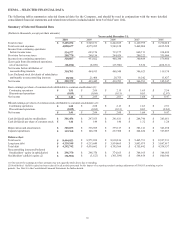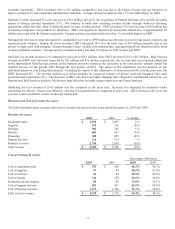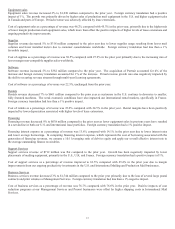Pitney Bowes 2010 Annual Report Download - page 25
Download and view the complete annual report
Please find page 25 of the 2010 Pitney Bowes annual report below. You can navigate through the pages in the report by either clicking on the pages listed below, or by using the keyword search tool below to find specific information within the annual report.6
Market deteriorations and credit downgrades could adversely affect our cost of funds and related margins, liquidity, competitive
position and access to capital markets.
We provide financing services to our customers for equipment, postage, and supplies. Our ability to provide these services is largely
dependent upon our continued access to the U.S. capital markets. An additional source of liquidity for the company consists of
deposits held in our wholly-owned industrial loan corporation, The Pitney Bowes Bank (the Bank). A significant credit ratings
downgrade, material capital market disruptions, significant withdrawals by depositors at the Bank, or adverse changes to our industrial
loan charter could impact our ability to maintain adequate liquidity, and impact our ability to provide competitive offerings to our
customers.
A portion of our total borrowings has been issued in the commercial paper markets. Although we continue to have unencumbered
access to the commercial paper markets, there can be no assurance that such markets will continue to be a reliable source of short-term
financing for us. If market conditions deteriorate, there may be no assurance that other funding sources would be available or
sufficient.
We may not realize anticipated benefits from our Strategic Transformation.
In 2009, we announced that we were embarking on an initiative called Strategic Transformation, a program focusing on how we
improve the way we go to market and how we interact with our customers while also reducing the company’s cost structure to make it
more flexible. The initiatives are aimed at optimizing our cost structure and efficiency through new system implementation,
outsourcing programs, and headcount reduction. If our new system implementation or outsourcing programs are not successful, the
savings from Strategic Transformation may not be sustainable.
Failure to comply with privacy laws and other related regulations could subject us to significant liability.
Several of our services and financing businesses use, process and store customer information that could include confidential, personal
or financial information. We also provide third party benefits administrators with access to our employees’ personal information.
Privacy laws and similar regulations in many jurisdictions where we do business, as well as contractual provisions, require that we and
our benefits administrators take significant steps to safeguard this information. Failure to comply with any of these laws, regulations
or contract provisions could adversely affect our reputation and business and subject us to significant liability.
The failure of our information technology systems could adversely impact our operating results.
Our portfolio of product, service and financing solutions increases our dependence on information technologies. We maintain a secure
system to collect revenue for certain postal services, which is critical to enable both our systems and the postal systems to run reliably.
The continuous and uninterrupted performance of our systems is critical to our ability to support and service our customers and to
support postal services. Although we maintain back-up systems, these systems could be damaged by acts of nature, power loss,
telecommunications failures, computer viruses, vandalism and other unexpected events. If our systems were disrupted, we could be
prevented from fulfilling orders and servicing customers and postal services, which could have an adverse effect on our reputation and
business.
Our inability to obtain and protect our intellectual property and defend against claims of infringement by others may negatively
impact our operating results.
We rely on copyright, trade secret, patent and other intellectual property laws in the United States and similar laws in other countries
to establish and protect proprietary rights that are important to our business. If we fail to enforce our intellectual property rights, our
business may suffer. We, or our suppliers, may be subject to third-party claims of infringement on intellectual property rights. These
claims, if successful, may require us to redesign affected products, enter into costly settlement or license agreements, pay damage
awards, or face a temporary or permanent injunction prohibiting us from marketing or selling certain of our products.
If we fail to comply with government contracting regulations, our operating results, brand name and reputation could suffer.
Many of our contracts are with governmental entities. Government contracts are subject to extensive and complex government
procurement laws and regulations, along with regular audits of contract pricing and our business practices by government agencies. If
we are found to have violated some provisions of the government contracts, we could be required to provide a refund, pay significant
damages, or be subject to contract cancellation, civil or criminal penalties, fines, or debarment from doing business with the
government. Any of these events could not only affect us financially but also adversely affect our brand and reputation.






